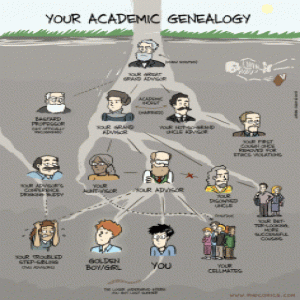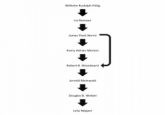Discovering academic ancestry

Are you academically related to a famous scientist? Has something from their training and scientific philosophies been passed down to you?

What’s your academic ancestry?
Credit: Jorge Cham http://phdcomics.com/comics.php?f=1419
The lab is like home, and the people who work there are like family. So, what’s your pedigree–your academic ancestry so to speak? If you follow the trail of who trained your mentor, and who trained their mentor before them, you might find that you are connected to some pretty prestigious scientists.
The idea is not uncommon. The folklore of academic lineages has been used for decades by professors seeking to inspire their graduate students with grand tales of their mentoring forebears. But the idea of tracking these academic lineages on paper is relatively new. In 2012, PLoS One published an article about a new online database called Neurotree (1). The authors created the database to track academic mentoring relationships among neuroscientists, in a family tree like format, where an advisor is like a parent and their advisor like a grandparent.
The interest in academic ancestry is not restricted to the life sciences. Other sources exist for mathematics, computer science, and theoretical physics. In 1999, the American Physics Society held the “Discovering Our Roots” contest, where physicists tracked their PhD lineage through the ages, some of whom linked back to groundbreaking researchers in the life sciences! Neurotree eventually expanded to include other academic fields and it now exists as academictree.org. The trees are not comprehensive and the resource is similar to Wikipedia in the sense that users can edit its content; but it highlights the interest that scientists have in uncovering their “ancestry.”
One reddit user who perused the database estimated that 65% of scientists are academically related to a Nobel prize winner. A number of other scientists have explored their own lineages through various means and published articles about their findings (2-4). Although the database includes other types of mentoring roles such as postdoctoral advisors, most people consider only their PhD advisor when mapping their academic lineage. Graduate school is where foundational traits and values for scientific careers are established—whether by inspiring traits to adopt or traits to avoid.
In this miniseries, we take a look at the academic lineages of some notable young scientists who are changing the world today. We explore the possibility of a family trait, so to speak: a type of training that is passed down through the ages from graduate advisors to trainees. Considering that so many scientists have at least one connection to a famous researcher, perhaps we all have the potential to become groundbreaking scientists.





